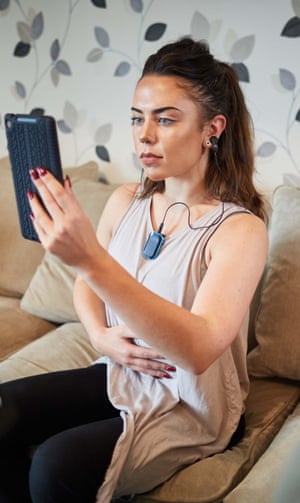On the unassuming second-floor office of a tech startup in Clerkenwell, London, Simon Fox is teaching me how to breathe. “You’re not trying to shove your stomach out with muscular force,” advises the design director of BfB Labs. “Instead, what you’re trying to do is feel your lungs expanding into your body. You don’t want to breathe hard, but you do want to be breathing into the bottom of your lungs.”
Clipped to my earlobe is a tiny heart-rate monitor, linked to a Bluetooth device that is attached to my T-shirt. I’m here to try out what Fox and his colleagues have dubbed emotionally responsive gaming (ERG): computer games designed to increase players’ resilience to mental health problems by using biofeedback to monitor and reward their ability to remain calm under pressure.
Between rounds in Champions of the Shengha, the company’s first offering, gamers must spend about a minute practising the kind of diaphragmatic breathing that is widely recommended as a relaxation technique; the more successfully they control their breathing, the more gems they win to spend on weapons and spells to defeat their opponents. In fact, it’s not the breathing itself that is tracked, but the player’s heart-rate variability (HRV), which increases in response to diaphragmatic breathing and lower levels of stress. A higher variation shows a body with a healthy ability to relax and respond to events.
That sounds pretty easy, I think, especially as I’m not really bothered how I fare in the fantasy-themed battling game (“Like Top Trumps but with way more interesting stuff going on,” is Fox’s explanation to a non-gamer). On my first attempt, I get four gems out of a possible 10; not bad for a first try, says Fox, who cites his own experiences of chronic anxiety as a driving force in his work. I’m determined to do better next time.

Champions of the Shengha began life more than two years ago, when Shift, a charity that works on behaviour change and social problems, was looking for a way to boost young people’s wellbeing in response to growing evidence of mental health issues among school-age children. It hit upon a computer game as a way of making the prospect of being trained in “emotional regulation” an attractive one, and was awarded £200,000 funding by Google’s Impact Challenge scheme.
Shift later incubated BfB Labs, which took on the development of the game. Keeping it genuinely enjoyable and credible as a game in its own right has always been key; ERG is being marketed to gamers not so much on the basis of its health benefits, but as an exciting new challenge.
“Half of all cases of mental health disorder start by the age of 14, and three-quarters by 24,” says Naomi Stoll, the project’s lead researcher. “Meditation, mindfulness and yoga are not the kinds of things that teenage kids, especially teenagers from disadvantaged backgrounds, are going to think are relevant to them and practise. Even 20 minutes of breathing every day is just not fun in any way.”
In a randomised control trial at the Billericay school in Essex earlier this year, more than four-fifths of the 90 pupils who played the game could reliably double their HRV through focused breathing. Three-quarters reported getting better at staying calm within the game, and a quarter said they had started using the techniques in everyday life.

The school had already seen a good take-up of mindfulness sessions, says deputy head Charlotte Berry, but it has mainly been girls, whereas Champions of the Shengha, which is played on a phone or tablet, has been embraced by both boys and girls.
“They very quickly started talking about how they were using the breathing in other aspects of their lives,” she says – including before important football matches, on occasions when they feared they would lose their tempers, and to deal with stress. Twelve-year-old Ryan Gibson used diaphragmatic breathing before his end-of-year exams and says it has also been handy at home: “I’ve got a younger sister who always annoys me. I use it to stop myself from reacting and saying something that would get me in trouble.”
Although there are a handful of other developers producing computer games that feed players’ emotions back into play, it’s a tool in its infancy. But gaming seems to have a wider role in promoting good mental health, says Dr Paul Cairns, a reader in human computer interaction at the University of York. “We feel better when we have a feeling of competence and autonomy,” he says. And games, unlike real life, present well-defined problems that are designed for people to succeed at: “They offer us the rewards we need.” Crucially, they also provide an escape from isolation, especially when you can play against people around the world online.
BfB Labs is planning future games to appeal to different audiences: Fox describes one as a “noir-y detective thing” where you have to keep your cool through a series of interrogations. Champions of the Shengha has just gone on sale on the crowdfunding site Indiegogo, where a beta version, including the biofeedback sensor, costs about £27, and there are also options to donate the kit to schools.
Back in Clerkenwell, Fox instructs me to place my hands on my chest and stomach to see which bits are moving as I breathe. I may not be engaged with the game itself, but it appears my naturally competitive nature is doing a fine job of ramping up the pressure: I overbreathe noisily. Only on my seventh try do I finally manage a five.
The next week, with multiple deadlines looming, I find myself absent-mindedly moving my hand to my stomach and adjusting my breathing. Something, it seems, has stuck.
And breathe: the computer games helping kids relax
Hiç yorum yok:
Yorum Gönder